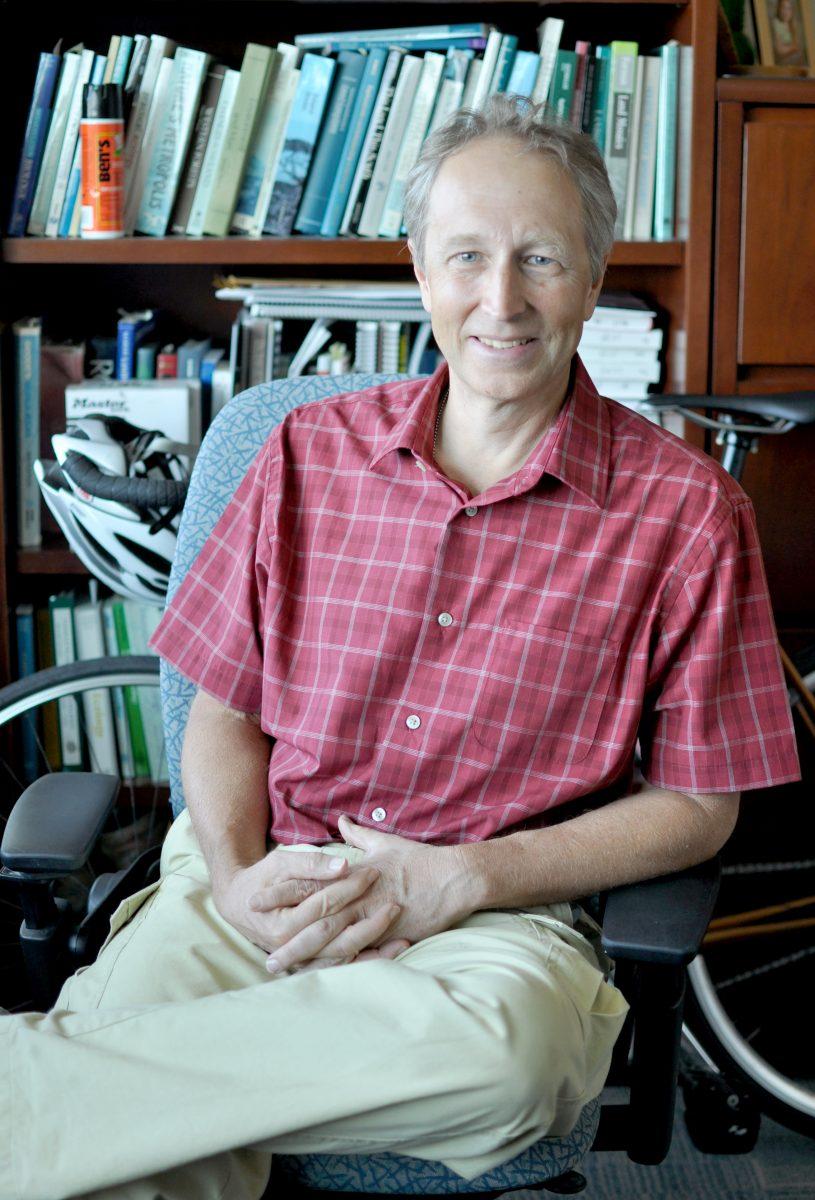George Hess uses the classes he teaches as opportunities to create a professional environment in which students provide solutions to problems in the real world, a technique worthy of one of the highest teaching awards in the state.
Hess is an associate professor in the Department of Forestry and Environmental Resources. The North Carolina Board of Governors named him as one of 17 recipients of the BOG Award for Excellence in Teaching for 2014.
Hess said the recognition honored not only him, but also the amazing work of the other nominees and past recipients. In his acceptance speech at the Teaching & Learning Symposium, Hess said he had worked with previous honorees, such as Rich Felder, Bill Swallow and Sarah Ash, who are also professors at N.C. State, and said the award was the work of the community.
“Wow, I’m honored and I’m just standing here stunned,” Hess said he told Chancellor Randy Woodson, who broke the news to him via phone call after Hess answered the call from a number he didn’t recognize.
Aside from receiving $12,500 and a medal as congratulations, Hess said he hopes to use his recognition as a platform for educational change.
“I worry about the process of grading because I’m asking students to take a lot of risks they’re not used to taking in class, and I know they’re worried about making a mistake,” Hess said. “I can comment on their work and tear it apart and it’s all good, but when I put a number on it, the dynamics in the class change and that bothers me. I don’t want to let grades get in the way of learning.”
The risks students take in Hess’ undergraduate classes resemble the environment a graduate student might find themselves in: courses designed around research topics, data collection, analysis, publications and working with outside agencies, Hess said.
This year in an undergraduate course about measuring natural resources, students worked with Raleigh Parks to learn about the number of people using the greenway system and activities they were using it for, while also collecting information about wildlife, soil and water on the greenways, according to Hess. The course culminated with a report to the City of Raleigh on their findings, as well as a public presentation at the Nature Research Center.
“Through this whole process, the students not only have to learn about the academic aspects of how one measures natural resources, but they also have to organize themselves and figure out all the logistics of getting out in the field and collecting the data and putting a report together with 30-something people involved, and a lot of what I do in the classroom is coach them through that process,” Hess said. “They counted 42,000 people during this process … and typically when they come into this class, they have no conception of how to deal with that and when they leave, they do.”
Outside of the classroom, Hess said he researches green-space conservation in suburban areas, or how the design of open spaces can affect and support wildlife. One aspect of that research involves looking at how paved pathways in greenways cut through wooded areas and how the width and proximity of the wooded area to the path affects the types of wildlife present in the area.
Hess also said he works with the WakeNature Preserves Partnership, an initiative dedicated to protecting open spaces by providing organizations with the resources to design a management plan to protect the spaces and support wildlife there.
Hess said, however, he did not start off in conservation. He worked as a software engineer for a few years until his dissatisfaction with the career led him on a path to biomathematics and how he could use math to understand biology and the environment, an interest he had since childhood as he witnessed the creation of the Environmental Protection Agency and the passing of the Clean Water Act.
“I wanted to apply computer programming to something more meaningful to me,” Hess said.
His programming skills came in handy with the design of his website, which Hess said serves as a creative outlet for him along with the photography he posts on the site.
Hess said he also enjoys cycling as a way to stay active, as he often cycles to work and participates in triathlons and charity rides. He grew up in New York City and saw cycling as an “amazing” way to get around due to its “level of freedom.”








